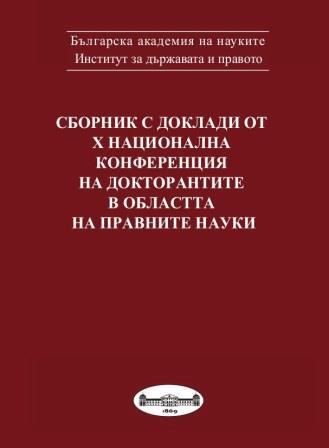ЕФЕКТИВНА ЛИ Е КОНВЕНЦИЯТА ЗА ЗАБРАНА НА РАЗВИТИЕТО, ПРОИЗВОДСТВОТО И СКЛАДИРАНЕТО НА БАКТЕРИОЛОГИЧНИ (БИОЛОГИЧНИ) И ТОКСИЧНИ ОРЪЖИЯ И ЗА ТЯХНОТО УНИЩОЖАВАНЕ ЗА ПРЕДОТВРАТЯВАНЕ НА ДОСТЪПА НА ЧУЖДЕСТРАННИ БОЙЦИ ТЕРОРИСТИ ДО ТЕЗИ СРЕДСТВА ЗА МАСОВО УНИ
IS THE CONVENTION BANNING THE DEVELOPMENT, PRODUCTION AND STOCKPILING OF BACTERIOLOGICAL (BIOLOGICAL) AND TOXIN WEAPONS AND ON THEIR DESTRUCTION EFFECTIVE TO PREVENT ACCESS FOREIGN FIGHTERS TERRORISTS TO THESE MEANS OF MASS DESTRUCTION?
Author(s): Milka Todorova-DobrikovaSubject(s): Law, Constitution, Jurisprudence, International Law
Published by: Институт за държавата и правото - Българска академия на науките
Keywords: Terrorism; globalization; radicalization; weapons of mass destruction; foreign terrorist fighters
Summary/Abstract: In modern conditions of development, one of the greatest dangers to humanity is international terrorism. In recent decades, the danger of using microorganisms as biological weapons has increased significantly. Biological weapons were banned in 1972, when the 1925 Geneva Convention was replaced by the Convention on the Prohibition of the Development, Production and Stockpiling of Bacteriological (Biological) and Toxic Weapons and on Their Destruction, signed in London, Washington and Moscow. The Convention entered into force in 1975 and is considered a key element in the international community's efforts to tackle the proliferation of weapons of mass destruction. But has the international community succeeded in codifying an effective mechanism to prevent this activity?
Journal: Сборник с доклади от национална конференция на докторантите в областта на правните науки
- Issue Year: 2021
- Issue No: 1
- Page Range: 255-263
- Page Count: 9
- Language: Bulgarian
- Content File-PDF

